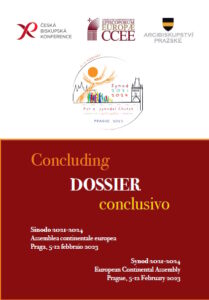 The final document to emanate from the European Synodal Assembly in Prague in February 2023 has been published.
The final document to emanate from the European Synodal Assembly in Prague in February 2023 has been published.
Quoting the Irish delegation twice on the subject of the ‘unhealed’ wound of abuse, the document concludes by listing eight priorities for the culminating synodal meetings of bishops in autumn 2023 and 2024. These do not explicitly include the clerical abuse issue, despite the contention of the Irish national synodal synthesis – supported by the Irish Bishops Conference – that a ‘reckoning’ on the issue is still needed.
The paragraph quoting the Irish submission on abuse reads:
39. The Church has inflicted deep wounds and at the same time has been deeply wounded. Many reports pay tribute to women and men who have courageously come forward to speak out about sexual, institutional, emotional, psychological, physical and spiritual abuse by members of the Church (Ireland). They also bring to the fore how the wounds caused by abuse have eroded the very credibility of the Church. Expressing disappointment for the dismissive and non-empathetic treatment of these people by the Church authorities, some ask: “To what extent is a distinction still made between the members of the institution and the institution itself?” (Nordic countries). Others see the responsibility for the cover-up of abuse cases as both individual and systemic: There are serious individual faults; too many clergy members abused their power and those responsible, not least the bishops, covered up the atrocities. But there are also systemic causes of the abuse of power. We cannot deny them. We are determined to draw the spiritual and structural consequences (Germany). Some call for more decisive steps to address the problem in a more transparent way: abuse is an open wound and will remain a barrier to communion, participation and mission until it is fully addressed (Ireland).
The eight priorities listed for the synodal assembly of bishops in Rome in October 2023 are as follows (Para 92):
- deepen the practice, theology and hermeneutics of synodality. We need to rediscover something that is ancient and belongs to the nature of the Church, while always being new. This is a task for us. We are taking the first steps along a path that opens up as we walk it;
- address the meaning of an all-ministerial Church, as a horizon in which to place the reflexion on charisms and ministries (ordained and non-ordained) and the relations between them;
- explore forms for a synodal exercise of authority, namely the service of accompanying the community and preserving unity;
- clarify the discernment criteria for the synodal process and at what level, from local to universal, decisions are to be made.
- take concrete and courageous decisions on the role of women within the Church and on their greater involvement at all levels, including in decision-making and taking processes;
- consider the tensions around the liturgy, so as to consider, from a synodal perspective, the Eucharist as the source of communion;
- care for a synodal related formation of the entire People of God, with specific attention to discerning the signs of the times, with a view to carrying out the common mission;
- renew the living sense of mission, overcoming the rift between faith and culture in order to once again bringing the gospel to people’s heart, finding a language that can articulate tradition and renewal, but above all that can walk with people instead of talking about them or to them. The Spirit asks us to listen to the cry of the poor and the earth in our Europe. In particular the desperate cry of the victims of war call for a just peace.
To read the complete final document click on: Final Document From European Continental Assembly in English and Italian.



Thanks for highlighting this important omission!
The abuse scandal has been the main catalyst for reforms in many countries; but it continues to be covered up in far too many countries!
And in no country is this more true, Colm, than in Italy, as Mark-Vincent Healy notes in his comment on Massimo Faggioli’s article.
Would the call to synodality ever have come but for the revelation of the cover-up of clerical abuse by bishops? What an irony if the Universal Synod were to culminate in a protracted discussion of synodality itself – as a fatal distraction from the question of a ‘reckoning’ on the disgraceful hiding of the abuse issue for generations, while children suffered without proper protection or warning.
The unanswered questions about the cover-up will cry out nevertheless. The credibility of the symbolism of the bishop’s crook, the shepherd’s staff, cannot possibly be restored simply by talking endlessly about synodality.